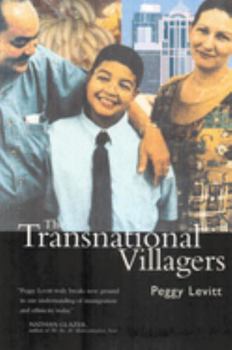The Transnational Villagers
Select Format
Select Condition 
Book Overview
Contrary to popular opinion, increasing numbers of migrants continue to participate in the political, social, and economic lives of their countries of origin even as they put down roots in the United States. The Transnational Villagers offers a detailed, compelling account of how ordinary people keep their feet in two worlds and create communities that span borders. Peggy Levitt explores the powerful familial, religious, and political connections...
Format:Paperback
Language:English
ISBN:0520228138
ISBN13:9780520228139
Release Date:July 2001
Publisher:University of California Press
Length:294 Pages
Weight:0.95 lbs.
Dimensions:0.7" x 6.0" x 9.0"
Customer Reviews
3 ratings
Very please with the book
Published by Thriftbooks.com User , 18 years ago
The arrived in a timely manner and in excellent condition
Better than would be expected explanation of Migrant Life
Published by Thriftbooks.com User , 18 years ago
Over eighty years ago, William Thomas and Florian Znaniecki postulated that the effect of immigration to the United States by over a million Poles would not only change the Polish arrivals, but would also alter the definition, at least slightly, of what it meant to be American-their study showed little concern for what would happen in Poland, and need not have contained any concern for a concept such as trans-nationality. As Peggy Leavitt shows though in her study of Dominican immigrants-specifically, and it would seem exclusively, Mirofloreños-to the Jamaica Plains section of Boston, The Transnational Villagers, large scale immigration of Dominicans to the United States have brought about radical and far reaching effects on the culture and economy of the Dominican Republic. As Leavitt demonstrates through the anecdotes of informants and about informants, Miraflores' residents, whether migrants or non-migrants, have had their ways life thoroughly altered by the presence of so many of their townsfolk in Jamaica Plains. These changes, in things as frivolous as dress and as serious as attitudes towards the opposite sex and marriage, are all part and parcel of a ideological and material dialectic going on between perceived Dominican norms and those arising from extended contact with American culture and economy. Dominican contact with American society is not a new occurrence. The fact baseball is more popular than soccer is but only one example of cultural exchange, and like the vast majority of immigrants making their way to the United States, they have some acquaintance with American popular culture even if only through media images. Trans-nationality among Dominicans of working class status is a relatively new affair, but one which is beginning to have far reaching effects-such as the relative ease with which Dominicans can attain bi-nationality because of legal reforms. In regards to assimilation into the mainstream of American culture, trans-nationalization can be as much an inhibiting factor as it is a promoter. Considering the examples that Leavitt gives of the working and living conditions of Dominicans in Boston, where most immigrants work long hours at jobs that do not bring them into contact with the larger Anglophone world, and the kind of problems that children apparently have trouble adjusting to either world when they go back and forth between the two, would both seem to be indications that trans-nationalization was not helping assimilation along. The fact that the Dominican Republic's government no longer treats trans-nationals as suspect, at least to the extent that people who hold American citizenship can hold most offices, may promote some form of assimilation, because the legal consequences of doing such has become virtually non-existent for those who may hope to return home. This will be a different form of assimilation than nineteenth and twentieth century immigrants experienced, but it will be assimilation of a sor
Accessible scholarly book on important new social phenomenon
Published by Thriftbooks.com User , 21 years ago
This book is a fun read; I enjoyed it very much. It's a well written, well researched account of how Dominican immigrants retain strong, multiple ties to their homeland. Sociologist Levitt explores the nature of these ties and their implications, drawing on many examples from her extensive fieldwork.




